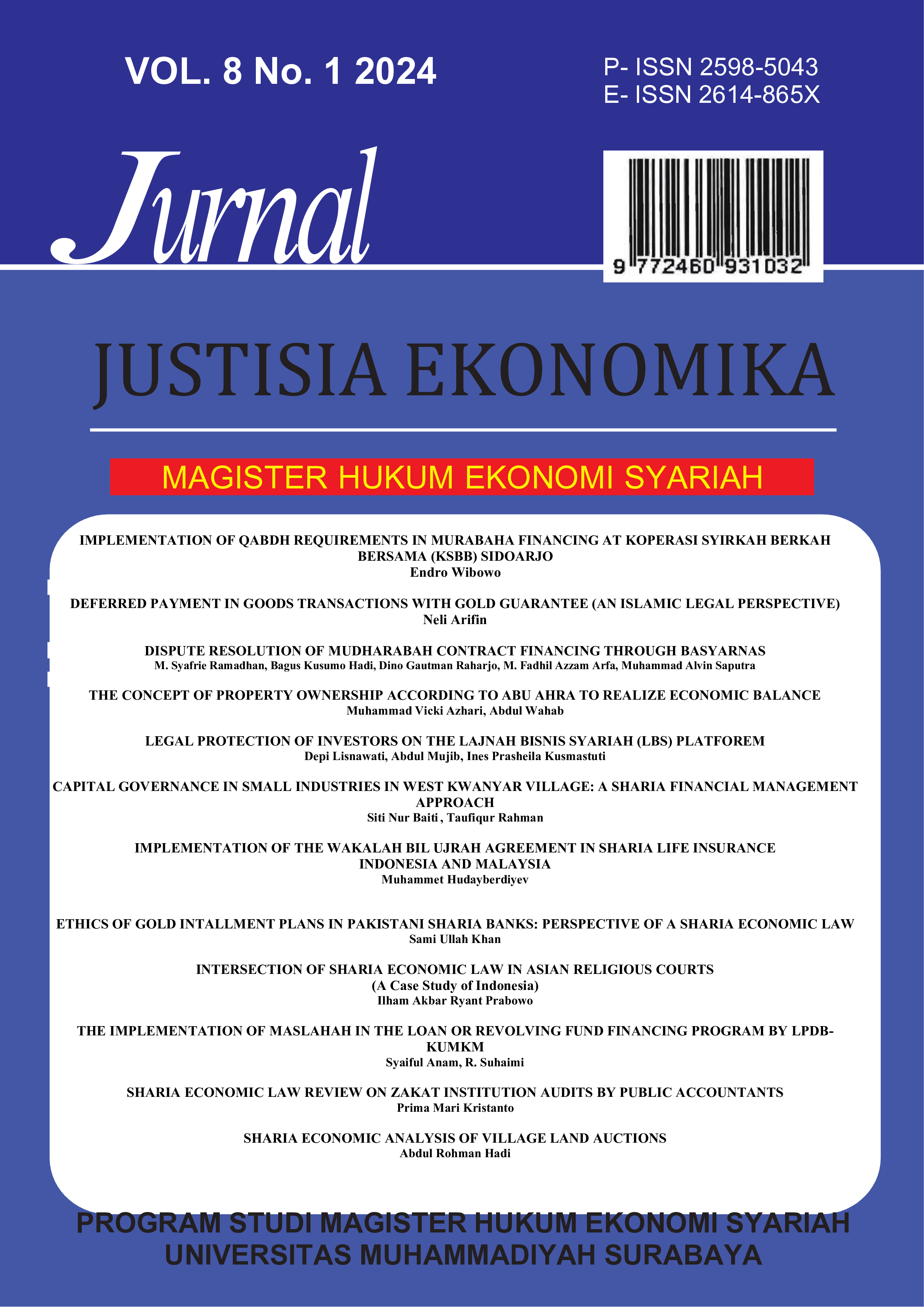ETHICS OF GOLD INTALLMENT PLANS IN PAKISTANI SHARIA BANKS: PERSPECTIVE OF A SHARIA ECONOMIC LAW
DOI:
https://doi.org/10.30651/justeko.v8i1.22273Kata Kunci:
Economic Ethics, Gold Installment Practices, Syariah Law PerspectiveAbstrak
Pakistan is the country with the largest Muslim population in the world, with a total population of 220 million, of which around 96% are Muslims. Islam plays a central role in social, cultural, and political life in Pakistan, a country with a rich Islamic heritage and cultural diversity. In global economic development, various demands have emerged to adapt to changing social and economic conditions increasingly diverse by society's needs. This significantly impacts the banking sector, which must innovate to remain competitive. In Pakistan, both conventional commercial banks and Islamic banks face similar challenges. Islamic banking, in particular, aims to meet the needs of Sharia-based financial transactions, considering that the majority of Pakistan's population is Muslim. One of the innovative products offered by Islamic banks is gold installments. This research uses qualitative methods to analyze gold installment products from the perspective of Sharia economic law and ethics. The aim is to identify the service mechanism for this product, ensure its conformity with the provisions of Islamic Sharia economic law and the fatwas of the Shariah Advisory Boards of Pakistan, and assess its benefits in terms of economic ethics. The research results show that the service mechanism for gold installment products with murabahah contracts at Sharia banks does not violate Sharia economic law and is by the provisions of the Pakistani Shariah Advisory Boards. This product is popular with the public because it makes it easier for them to buy gold in installments, considering that gold is an asset whose value tends to increase.
Referensi
Abduallah Syeed, Menyoal Bank Syariah: Kritik Atas Interpretasi Bunga Kaum Neorevivalitas. (Jakarta: Paramadina, 2004) 119
Ar Razi, Mafatih al Ghaib,jilid II, 358 ; Ewandi Tarmizi, Harta Haram Muammalat Kontemporer (Bogor: Berkat Mulia Insani, 2013), 339.
Antonio M. Syafi’I. 2001. Bank Syariah dari Teori ke Praktek. Jakarta: Gema Insani.
Bank syariah , ”Kriteria dan Produk Layanan,” dalam http://www.syariahmandiri.co.id/category/consumer - banking/ (Kamis, 25 Oktober 2018)
B. Gamal, T., Micali, S., and Schneier, Applied Cryptography, Second (New York: John Willey and Sons, Inc, 2022).
Butt Usman, Pakistan : Chapter Title : Changing Dynamics in The War on Terror : The Islamic Orientation of The Pakistani State and The Islamic Reaction of The Masses (Pluto Press, 2012).
C. C Christine Fair, Islam and Politics in Pakistan. Dalam A. M. Rabarsa, C. Benard, P. Chalk, C. C. Fair, T. Karasik, R. Lal, . . . D. Thaler, The Muslim World After 9/11 . RAND Corporation (RAND Corporation, 2004).
Djakfar Muhammad. 2007. Agama, Etika, dan Ekonomi: Wacana Menuju Pengembangan Ekonomi Rabbaniyah. Malang: UIN Malang Press.
Ewandi Tarmizi. 2013. Harta Haram Muammalat Kontemporer. Bogor: Berkat Mulia Insani.
Fiqul Wadih Warsidi, “ANALYSIS OF THE REALITY OF FORTUNE AND PROFIT ACCORDING TO ISLAMIC ECONOMICS,” Asean Comparative Education Research Journal on Islam and Civilization Vol 6, No (2023).
Herlan Firmansyah dan Endang Hendra. 2015. “Implikasi Globalisasi Ekonomi dan PerdaganganBebas Terhadap Stabilitas Nilai Rupiah”, Jurnal Asy-Syari’ah, Vol.17 No.1.
Hermansyah. 2005. Hukum Perbankan Nasional, Jakarta: Prenada Media.
Ibnu al-Manzur, al-Maktabah al-Saymilah, 2005. 3765.
Ibnu Jazy ; Wahbah al-Zuhaili, Fiqh al-Islami wa Adillatuhu; Ibnu al-Manzur, al-Maktabah al-Syamilah, 2005, 263
Ibnu Rusyd. 2007. Bidayatul Mujtahid, jilid 2. Jakarta: Pustaka Azzam.
Jaih Mubarok. 2004. PerkembanganFatwa Ekonomi Syariah di Pakistani. Bandung: Pustaka Bani Quraisy
John W Cresswel, Research Design, Pendekatan Kualitatif, Kuantitatif, Dan Mixed. (Yogyakarta: Pustaka Pelajar, 2016).
Muhammad Djakfar, Agama, Etika, dan Ekonomi: Wacana Menuju Pengembangan Ekonomi Rabbaniyah (Malang: UIN Malang Press, 2007), 26.
M. Syafi’I Antonio, Bank Syariah dari Teori ke Praktek,(Jakarta: Gema Insani, 2001), 102
Praveen Swami, India, Pakistan and The Screet Jihad : The Covert War In Kashmir 1947-2004 (New York: Routledge., 2007).
Rachmad Syafi’i, Fiqih Muammalah, (Bandung, Pustaka Setia, 2004), 75.
Sugiono, Metode Penelitian Kuantitatif, Kualitatif, Dan R&D, Thirrd (Bandung: Alfabeta, 2021).
Syafi’I Rachmad. 2004. Fiqih Muammalah. Bandung, Pustaka Setia.
Syarifuddin Amir. 2003. Garis-garis Besar Fiqih. Bogor: Kencana.
Syeed Abduallah. 2004. Menyoal Bank Syariah: Kritik Atas Interpretasi Bunga Kaum Neorevivalitas. Jakarta: Paramadina.
Syukuri Iska, Sistem Perbankan Syariah (Yogyakarta: Fajar Media Press, 2014), 200
Veitzhal Rivai dkk. 2010. Islam ic Banking: Sistem Bank Islam Bukan Hanya Solusi Menghadapi Krisisis Namun Solusi Dalam Menghadapi Berbagai Persoalan Perbankan dan Ekonomi Global.Jakarta: Bumi Aksara.
Wahbah Az Zuhaili.2011.Fiqih Islam Wa Adillatuhu. Jakarta: Gema Insani.
Warsidi, Strategi Pemasaran Produk Bank Syariah (Yogyakarta: Zahir Publishing, 2023).
Wiroso. 2005. Jual Beli Murabahah. Yogyakarta: UII Prees.
Yusuf Qardawi.1997. Norma dan Etika Ekonomi Islam . Jakarta: gema Insani Press.
Unduhan
Diterbitkan
Cara Mengutip
Terbitan
Bagian
Lisensi
HAK CIPTA
Penulis yang mengirimkan artikel dalam jurnal Justisia Ekonomika harus memahami dan menyetujui persyaratan tentang hak cipta jurnal Justisia Ekonomika sebagai berikut:
1. Hak Cipta tulisan / artikel yang diterbitkan di jurnal Justisia Ekonomika otomatis menjadi hak pengelola jurnal atau publisher
2. Meskipun Hak Cipta atas tulisan yang telah diterbitkan di jurnal Justisia Ekonomika adalah menjadi haknya publisher, tetapi penulis masih mempunyai hak untuk : a). Penulis boleh meng-upload di repository kampus, b). Penulis boleh meng-upload di webnya sendiri, c). Penulis boleh meng-upload di google schoolar, orchid dan sinta
LISENSI
Lisensi atas tulisan / artikel yang diterbitkan di jurnal Justisia Ekonomika adalah menggunakan Creative Commons dengan atribusi CC-BY-NC 4.0






















